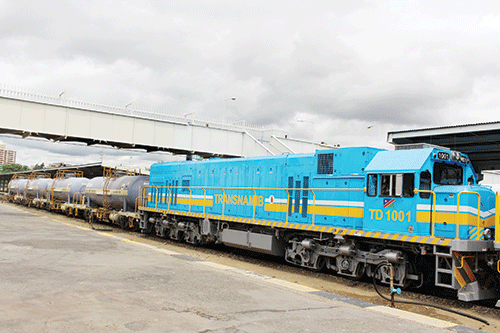Cash-strapped rail operator TransNamib has spent the last year looking to replace CEO Johny Smith, who left in mid-2023 after turning down a lucrative fresh five-year contract.
The union representing the company’s workers has expressed concern about management’s delay in pronouncing itself on the matter. The secretary general of the Namibia Transport and Allied Workers Union (Natau) Narina Pollman told New Era that the union is equally concerned about the secrecy surrounding the CEO’s appointment, and they raised this issue with the board two weeks ago.
“We were informed that the board would convene today (Wednesday), and we expect to be informed of the way forward by next week (this week),” said Pollman.
“We will make an announcement when we have something meaningful to announce,” stated board chairperson Theo Mberirua when approached by this publication last week.
He emphasised the sensitivity of the CEO’s appointment, and requested that it be handled “professionally”.
Efforts to obtain comment regarding the process from the public enterprises’ ministry have also been unsuccessful.
Sources at the ministry, however, indicated that the process is at an advanced stage.
New Era understands that interviews for the CEO position were held in February.
“The process is protracted without an end in sight, and seems to be shrouded in secrecy,” an insider said.
Amongst the five candidates interviewed, New Era is informed that it includes businessman Brian Nalisa, current acting TransNamib CEO and human capital executive Webster Gonzo, and Michael Veldman.
The highly-secretive interviews, this publication has been reliably informed, allegedly took place at the Hippy Tjivikua-led Walvis Bay Corridor Group’s offices in the capital.
Tjivikua, a former TransNamib executive, has also been linked to the job, despite never applying for it or even participating in the interviews.
Tjivikua factor
New Era has reliably learned that Cabinet officials prefer Tjivikua, who at one point served as an executive at TransNamib, over Gonzo.
But there is a catch: Tjivikua was never interviewed for the position, which has complicated matters.
Several attempts to get comment from both men hit a cul-de-sac.
Gonzo referred this reporter to Mberirua, while Tjivikua’s number rang unanswered.
Approached last week, board member Johana Hatutale, who chairs the human resources committee, declined to comment, saying it was not her purview.
Loan conditions
Meanwhile, the entity’s spokesperson Abigail Raubenheimer last week said the recruitment process has been initiated, and is underway.
“We anticipate making an announcement once the process has been fully completed,” she added.
The appointment of a CEO is not only essential for the efficient operations of the struggling entity, but also a prerequisite for funding from the Development Bank of Southern Africa (DBSA) and the Development Bank of Namibia (DBN), this paper understands.
In 2022, TransNamib received a N$2.6 billion loan intended to bolster national rail infrastructure, and catapult the financially- challenged entity to profitability.
However, disbursement of the funds is contingent upon meeting certain conditions, including the confirmation or appointment of a substantive CEO.
The entity’s resurrection relies on the N$2.6 billion loan.
Without providing specifics, Raubenheimer said the company is in the final stages of meeting the conditions to access the funds.
Limping
TransNamib has been making headlines for all the wrong reasons over the years.
Talks of possible liquidation surfaced following the demise of Air Namibia in 2021.
The entity continues to face significant financial challenges due to its short-term cash flow issues and limited rolling stock capacity, resulting in a compromised financial position.
For a company solely dependent on rail movement, TransNamib’s woes are exacerbated by faulty locomotives, ageing railway infrastructure and governance issues, amongst many others.
However, Raubenheimer said the next two years would be critical for the entity, requiring the procurement of equipment and the maintenance and refurbishment of existing assets to position the company for increased revenue-generation.
Broke
Reports in 2022 indicated that the company was operating at a monthly loss of more than N$10 million, and largely depended on government subsidies to fund its day-to-day operations.
Asked if this is still the case, Raubenheimer said “shareholder support alone is not a sustainable long-term solution”.
“It is imperative that we address our rolling stock challenges to enhance revenue-generation and ensure the long-term sustainability of TransNamib as a state-owned enterprise. Our current equipment is quite outdated, ageing over 60 years, and their lifespan has ended,” she emphasised.
Their priority is thus to address locomotive capacity through short-term measures.
“In terms of long-term planning, the purchasing of 25 new locomotives will be done with arrivals expected in 2026. Thus, TransNamib’s immediate priority is to address our short-term locomotive capacity until the arrival of the new locomotives,” she stated.
The lack of funds has also impacted the implementation of the 2018 strategic business plan, which was supposed to help them break even in 2023.
For the coming financial year, the company has been allocated N$300 million by the Treasury.
Progress
Despite the funding challenges, TransNamib, according to Raubenheimer, has made considerable progress towards sustainability.
In the 2019/2020 financial year, TransNamib achieved historic revenue growth, with a remarkable 10.5% increase in freight revenue.
“TransNamib’s property revenue has doubled over the past five years. The company achieved its first unqualified audit in over a decade, along with the annual general meeting (AGM) for seven years in 2020, signifying efforts to clear historical financials, and has continued to boost its corporate governance efforts with annual AGMs,” she continued.
Securing the N$2.6 billion funding from DBSA/DBN is another success story, followed by the revived Aus to Lüderitz line, which has been dormant for 20 years, the spokesperson said.
– ashikololo@nepc.com.na


